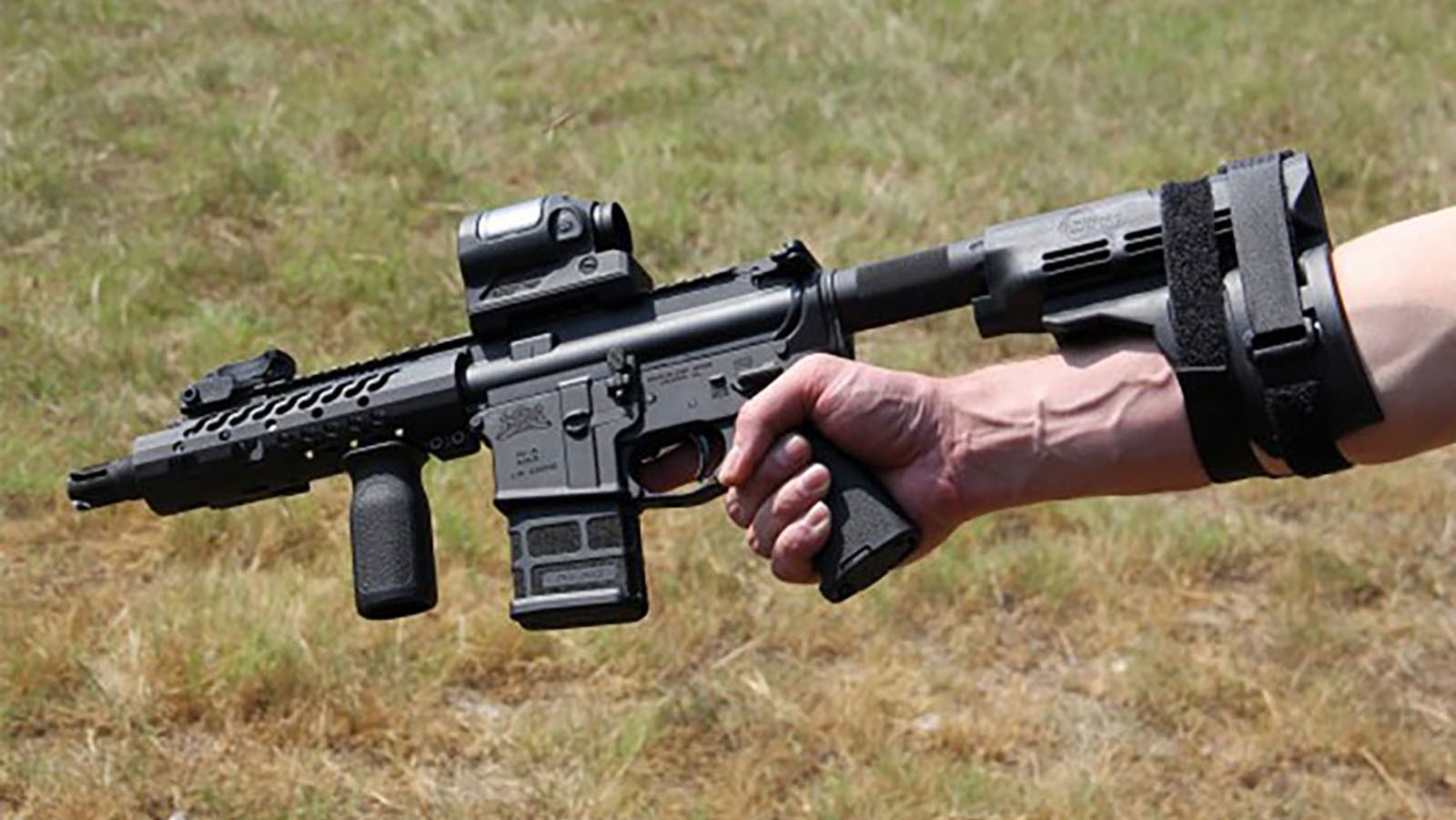A federal judge in North Dakota said Tuesday that he doubts the arguments of Wyoming and 24 other states against the ATF over its new rule restricting pistol braces.
Because of his doubt, U.S. District Court Judge Daniel Hovland declined to block the ATF from enforcing its new rule in those states.
The ruling contradicts another order from the federal Fifth Circuit Court in Louisiana, where a panel of judges ruled 2-1 to temporarily block the ATF’s restrictions on pistol braces in Mississippi, Louisiana and Texas.
Wyoming and 24 other states sued the ATF and U.S. Attorney Merrick Garland in February, challenging the ATF’s rule. The rule treats pistols fitted with stabilizing braces as short-barreled rifles, which are heavily restricted and illegal to possess without a registration.
A pistol brace is a fixture enabling a shooter to fire a heavy pistol with one hand. They’re useful for helping disabled or weakened shooters to be more accurate and controlled.
Manufacturers also tout braces by which shooters can shoulder their pistols. That adds controversy to the device, since the act of shouldering a pistol resembles shouldering a short-barrelled rifle.
People who refuse to register, disassemble or destroy their braced pistols may now face felony gun charges. Between 3 million and 10 million braced pistols are impacted by this change.
The Fifth Circuit Court reported that so far, only about 8% of gun owners are complying with the rule.
Wyoming and its fellow plaintiff states claim ATF took an interpretive leap from Congress’ gun control laws and made an about-face from its earlier guidance.
Hovland disagreed. He didn’t announce that the states will lose the case, but he said he doubts they can win. And for that reason, he declined to block the ATF’s enforcement of the rule within the suing states during their case.
ATF Made A ‘Reasonable’ Rule, Says Judge
“This Court finds the ATF has acted within the ‘zone of reasonableness’” in making a rule that people can understand and follow, wrote Hovland in his Tuesday order denying the states’ request for a preliminary injunction against the rule.
The states argue that ATF was merely codifying a gun-grabbing rule to gratify President Joe Biden, and in so doing exceeded its lawful authority to interpret Congress’ laws. They point to imprecise criteria in the rule and criticize it as arbitrary.
But the ATF includes “reasonable” descriptors of the action it was targeting, wrote Hovland. He noted that the ATF rule language outlaws any firearm designed or intended to be fired from the shoulder.
Second Amendment Not Looming
This rule is an interpretation of the National Firearms Act from the late 1930s gangster era of short-barreled rifles, the judge noted. Courts have upheld restrictions on short-barreled rifles as constitutional.
So, Wyoming’s case is a dispute over whether the ATF’s interpretation of braced pistols is accurate, not whether the braced pistols – once classified as short-barreled rifles – should be unrestricted, wrote Hovland.
“The ATF’s Final Rule simply identifies criteria for short-barreled rifles and does not implicate the Second Amendment,” the judge wrote.
Siding With The Dissenter
Hovland acknowledged the Fifth Circuit Court’s Aug. 1 ruling blocking the ATF from enforcing its rule in three Southern states.
In that case, Mock v. Garland, the plaintiffs are challenging the rule as a violation of the Second Amendment and as a violation of procedural rulemaking laws. The two judges who issued the preliminary injunction said it seems the ATF’s rule acts like a new law and departs from the language ATF first used when announcing the impending rule to the public.
A circuit judge who wrote a concurring opinion in that ruling also said that the ATF’s rule does seem to violate the Second Amendment.
Hovland wasn’t persuaded. He sided instead with the one dissenting judge, Stephen A. Higginson.
The ATF wasn’t pulling a trick on the public by changing its rule’s final language from the original propsed language, Higginson wrote in his dissent. Rather, the agency was responding to massive criticism against the proposed rule.
Messing With The Market
Another of the arguments by Wyoming and the other states that Hovland rebutted was that the ATF didn’t conduct an adequate cost-benefit analysis. The states allege that the ATF didn’t take into account the financial detriment from heavily regulating between 3 million and 10 million weapons, and didn’t make an effort to show how the rule could benefit everyone.
Hovland invoked a ruling on this same final rule from a different federal court to explain his disagreement.
In that case, Miller v. Garland of 2023, the court said that federal rules that make the public safer are “immeasurable” in a cost-benefit analysis.
“The Final Rule provided an otherwise adequate though not perfect cost-benefit analysis,” the Miller court ruled.
Interpretive, Not Legislative
Hovland rebutted yet another of the states’ arguments: that the ATF’s rule went into effect too quickly since it looks more like a new law than a mere interpretation.
The judge noted that the ATF did enact a waiting period on its rule, giving gun owners until the end of May to get their braced pistols registered.
Also, Hovland decided, this rule is “interpretive,” not “legislative,” so it could take effect immediately without falling under the mandatory 60-day waiting period anyway.
With this ruling the North Dakota Judge once again contradicts his peers in Louisiana, who deemed the ATF rule legislative.
“Taken together, the Plaintiffs have not shown they are entitled to the extradordinary remedy of prelminary injunctive relief at this early stage of the proceedings,” Hovland wrote. “The Court finds they have not, at this preliminary stage, demosntrated a substantial likelihood of success on the merits.”
There are other factors a court must consider when deciding to issue a preliminary injunction, such as whether the plaintiffs could suffer irreparable harms if the rule is allowed to go into effect.
But Hovland didn’t need to address these other factors, he wrote, because the most consideration is the states’ chances of winning.
And their chances of winning are improbable enough to wreck their chances of winning a prelminary injunction that would block the rule, Hovland decided.
Clair McFarland can be reached at clair@cowboystatedaily.com.





